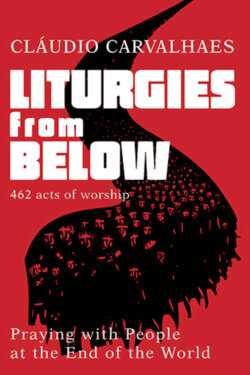Читать книгу Liturgies from Below - UK Edition - Carvalhaes Claudio - Страница 6
На сайте Литреса книга снята с продажи.
FOREWORD
ОглавлениеWorship is central to Christian discipline and service to God. According to William Temple (1881–1944), it is the sum total of our adoration, “the most selfless emotion of which our nature is capable.”1 In that sense, worship is counter to idolatry, the ultimate expression of loyalty, and an outright display of defiance to all “authorities” and “powers” (Eph 6:12)—all forces of domination and control, that which the Council for World Mission (CWM) labels as Empire. In other words, worship is subversive because, through the act of worship, the worshipper says yes to God and in so saying automatically says no to empire and all the “ungods” of our time, all the systems and forces that claim supremacy.2
In the book of the Revelation, worship is interwoven throughout the entire book in an uncompromising message to Caesar that the Christian community could and would pay homage and pledge allegiance to God and God alone. To heed the words “Be faithful even to the point of death” (Rev 2:10) was to declare and devote primary, unconditional, and selfless loyalty to God alone.
Then I heard every creature in heaven and on earth and under the earth and in the sea—I heard everything everywhere say,
“Blessing, honor, glory, and power
belong to the one seated on the throne
and to the Lamb
forever and always.”
Then the four living creatures said, “Amen,” and the elders fell down and worshipped. (Rev 5:13-14)
This was the shout of “many angels. . . . They numbered in the millions—thousands upon thousands” (Rev 5:11). Gathering to worship God was a direct defiance of Caesar’s decree that everyone in Asia Minor worship him; and this was at a time when Christians were being persecuted, even killed, for disobeying this decree.
This volume on worship is a well-needed resource, and it is long in coming. It is the answer to a long-held dream of CWM. When CWM decided to name Empire as the context of mission, we agreed that we should develop worship material to enable and support the people of God to offer this “most selfless emotion” to God in the context of Empire. We said then that dispassionate, lifeless, and disinterested words will not embolden faith, expose false power, and embrace—with unmistakable and uncompromising clarity and devotion—the God of faithfulness and justice.
The content of this book reflects the people of God in their deep struggle and search to find meaning in “Unexpected Places.” More important, the writers cause us to see the inextricable intertwining of worship with all of life. Here they present worship as wrestling with God in defiant determination. The writers confess their allegiance to God and God alone, baring their heart and soul in these litanies of lament, protest, and praise. The songs and prayers in this volume are meant to inspire “the eyes of [the] heart” of the worshipping community to be “enlightened” (Eph 1:18 NIV), to deepen our faith in the God of life, and to fortify our spirits for renewed commitment to justice and peace as the lived expression of worship.
Just as important as the content of this volume is the process that led to harvesting and producing the material for publication. Through a process of engagement with real-life situations, a group of worshippers, students, and leaders of worship spent time in contexts where people live in poverty and hopelessness. They listened to stories of suffering and pain, contemplated the presence of God and the meaning of hope, and out of that incarnational experience developed worship material to express true feelings of discontent with the world and conversation with God. This is true worship, the kind that springs from the bowels of discontent, anchors faith in the God of the risen Jesus, and calls forth commitment to resistance and transformative praxis.
I celebrate this long-awaited publication and commend it as a resource to further enhance our understanding and enrich our worship.
Collin I. Cowan
General Secretary, Council for World Mission, Singapore
The Council for World Mission is a worldwide partnership of Christian churches. The 32 members are committed to sharing their resources of money, people, skills, and insights globally to carry out God’s mission locally. CWM was created in 1977 and incorporates the London Missionary Society (1795), the Commonwealth Missionary Society (1836) and the (English) Presbyterian Board of Missions (1847).
1.William Temple, Readings in St. John’s Gospel, vol. 1 (London: Macmillan, 1939), 68.
2.See Burchell Taylor, The Church Taking Sides: A Contextual Reading of the Letters to the Seven Churches in the Book of Revelation (Kingston, Jamaica: Bethel Baptist Church, 1995).
